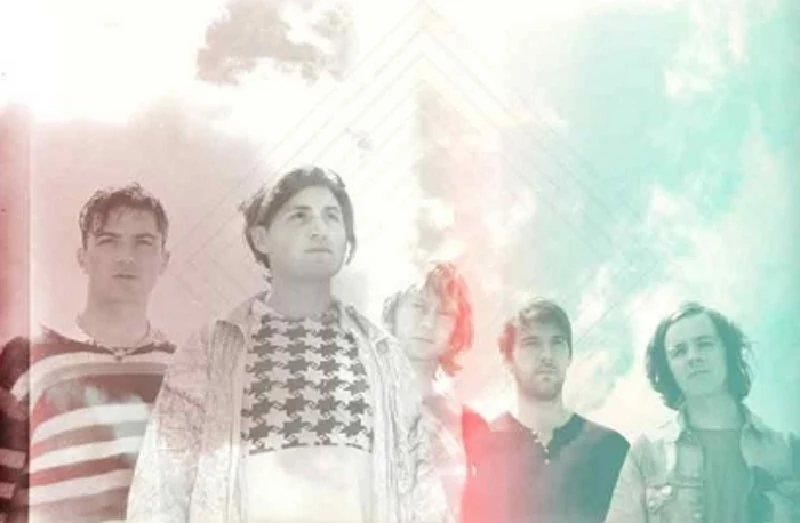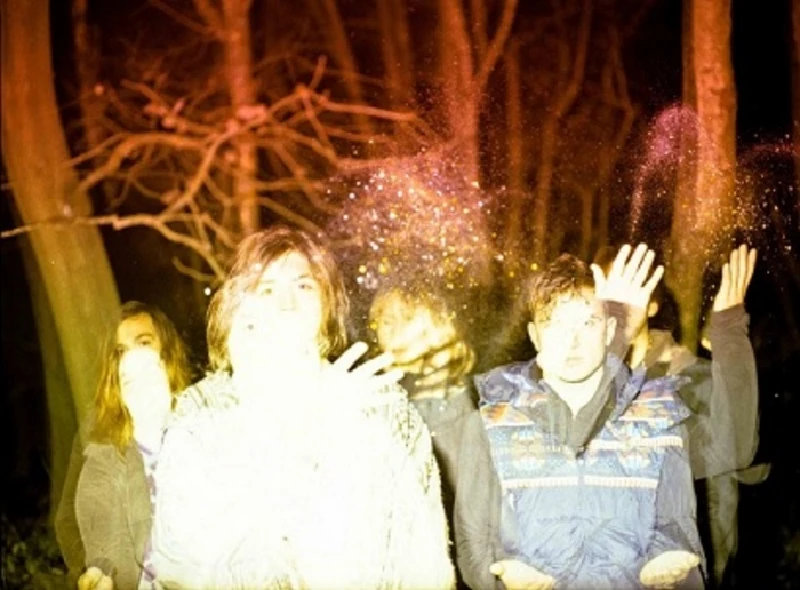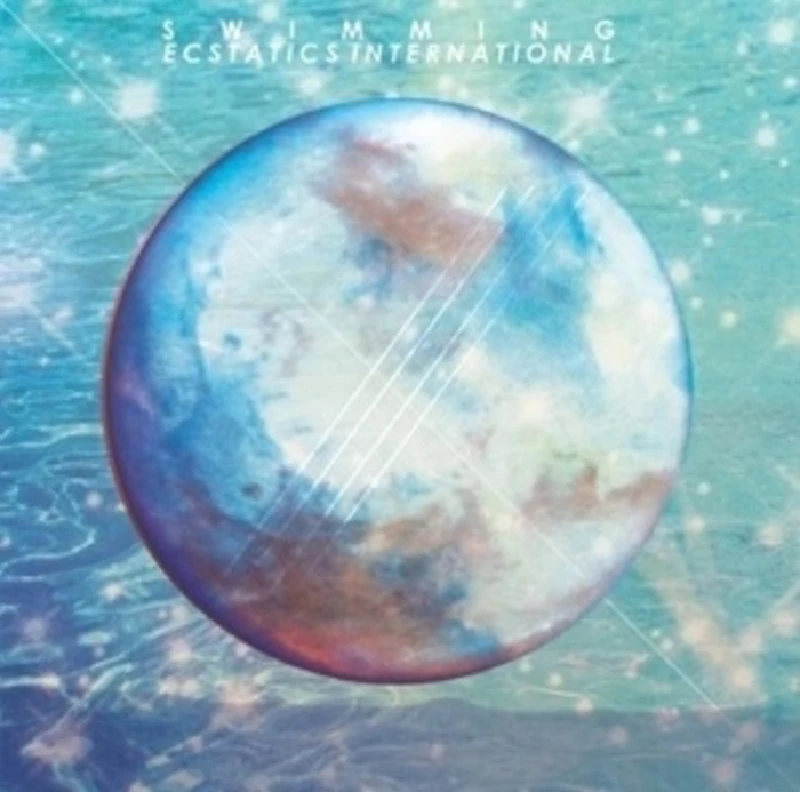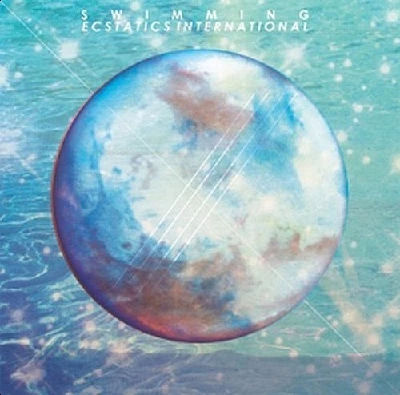Swimming - Interview
by John Clarkson
published: 26 / 11 / 2011

intro
With their second album 'Ecstastics International' just out, John Sampson from Nottinghamshire-based electronic five-piece Swinmming talks to John Clarkson about the dark undersurface to their anthemic and euphoric sound
Swimming are a Nottinghamshire-based electro five-piece, whose line-up consists of John Sampson (vocals, keyboards, guitar), his brother Peter Sampson (drums), Jonathon Spittlehouse (guitar), Andrew Wright (keyboards), and Blake Pearson (bass). The group’s music, an inventive combination of euphoric pop beats and whirling psychedelia, has confused critics who have found it difficult to push them easily into a category. Yet their anthemic and glittery sound has a dark undersurface. Their second album, ‘Ecstatics International’, which came out in November, is a follow-up to their 2009 debut,’ The Fireflow Trade’ and its subject matter includes loneliness, violence, breakdown and attempted suicide, and death and bereavement. Pennyblackmusic spoke to group founder John Sampson about the contrasts in Swimming’s music. PB: The new and second single, ‘Neutron Wireless Crystal’, from 'Ectastics International' takes its name from the crystals used in early transistor radios. What is that song about? JS: It’s mainly about overcoming this feeling of being disjointed from life. About being connected, not just tolerant or apathetic, towards people. The radio was one of the first instruments that made instant far-reaching connections a reality and now we have millions of ways of doing that and it’s bringing people together, but the challenges of co-existing and a sense of ‘otherness’ is still everywhere. There is still massive inequality and prejudice all around and it’s hard to know what part we can play in changing anything in a way that really means something. The song’s a weird personal take on that stuff. PB: The first single from the album, ‘Sun in the Island’, was about how your girlfriend was shot through the window of the taxi she was travelling in your native Nottingham last year. ‘Team Jetstream’, its B side, is about the death of your grandmother and ‘Mining for Diamonds’, the B side of the new single, was written after a spate of your friends either endured breakdowns or attempted suicide, all within a short time of each other. These must have all been horrendous experiences, yet the music for these songs far from being melancholic is giddy and euphoric in sound. If Swimming has an overall aim, is it about both personally and also hopefully universally trying to find positivity and optimism and to make sense of difficult issues, even against the most defying odds? JS: Definitely. We have a choice on how we view and deal with the changes and chances of the world. The album tries to have a more universal way of exploring some of these personal events. Music can be a ladder to lift you up out of moods and situations in an affecting way and that’s always been integral to the reason for us writing songs or playing an instrument. PB: The critics have had a hard time categorising Swimming, who have drawn comparisons with over a hundred bands and acts as diverse as the Flaming Lips, MGMT, Brian Eno and My Bloody Valentine. That must be something that you are enormously proud of. In these formulaic times, do you feel that being difficult to pigeonhole has, however, also in some ways gone against the band? JS: Yeah – the list is growing more interesting for bands we have been compared to and you are right. It’s been a blessing and a curse. Hopefully the ambiguity will encourage people to investigate the album themselves. It’s made it hard to find a ‘scene’ to pen us with; we probably should have been a bit more media-savvy in the early days and just invented a scene. The bands you’ve listed are all mighty flattering. It ia also been a good way of discovering new bands though. We hadn’t heard too much of a lot of the references, particularly the 80’s bands like Japan or Scritti Politti. We don’t sound much like them in my opinion but they made some ace music. PB: The group’s first album, ‘The Fireflow Trade’, came out in 2009 on your own label Colourschool Records. For this new album, you have signed to Tummy Touch Records. For those who haven’t heard the first album, in what other ways too do you see the new album as having progressed from the first album? JS: ‘Ecstatics’ is a sequel to the first one. They deal with a lot of the same ideas but from a different perspective. The new one is much brighter and the contrast has been cranked right up. Our bassist Blake Pearson designed the artwork for the album and it is a great illustration of the differences between them, from the colours to the objects. We produced both albums ourselves and both times you get to the end of the process and we’re all united working on this streamlined energy and you think, “ Right we kind of know what we’re doing now. We should probably start again.” There will hopefully be a similar development for the next one. PB: ‘Ecstatics International’ was self-produced and recorded largely in your own studio which is in a small mining village near Nottingham. It has an epic sound and involves a lot of striking and inventive, but often complex arrangements. How long did it take to make the album? Was it a difficult album to record and, given that you must have been on a very small budget, did you have to compromise on your original vision for it at all? JS: I think the budget and equipment limitations totally made ‘Ecstatics’ what it is. It is meant to sound epic and psychedelic and escapist in places and if we had a huge budget and we bossed off to do it in the sun in a shit-hot studio in the Caribbean (not that we could) it would undermine the core purpose for writing this album. ‘Sun in the Island’ is called that because it’s about changing ourselves and creating our own content with what we have in ourselves, in our communities and stuff. Ultimately we had the tools to do what we wanted with the right blend of lo-fi and hi-fi equipment in some great spaces and in our own time. We spent the best part of a year on it, between working other jobs, touring and finding the time to create the atmosphere to write and record. It’s not an exclusive thing though; we would collaborate with a producer if the right match came along. PB: You write the lyrics. How does the songwriting in the band come together? JS: It starts with sketches and saplings on loop pedals and on the laptop. I had stacks of them waiting to be developed in the studio to be made into full tracks. They enter the studio at all different levels of completeness. Sometimes it’s just a chord progression and a beat. At other times the whole arrangement is sketched out. Peter, Andy and Joff all came up with the first ideas for tracks on this album too. The writing and recording are all blended together, with a lot of the sketched stuff making the final mixes. PB: You have been pioneering a process called the binaural technique. Your videos for ‘Neutron Wireless Crystal’ and ‘Mining for Diamonds’ were recorded in binaural, and you are going to be closing the year by playing a gig in Nottingham in binaural which will be like the videos be a headphones own experience. What is binaural and what do you feel that it has over other recording techniques? JS: It all came through meeting Dallas Simpson. He is a sonic artist in Nottingham who has been doing binaural recordings for decades. He gets two tiny mics, one in each ear and records what he hears. When you listen back to the recording on headphones it is like you are putting on his ears. You hear it all exactly as he heard it. This is such a personal and intimate way of listening to music. There is no studio trickery, no processes added, it’s just the way humans hear sound, captured in the purest way. We’ve been playing around with how to best record versions of these songs using this technique and it made sense to go and find interesting locations and setups where you wouldn’t normally get to hear live music, like in a dome in a forest or on a beach. The live gig is the same idea but in two spaces – one where we will be in playing and the other where the audience will be, all wearing headphones wired directly into Dallas’ ears as he moves around the music. We’re going to be doing live remixes of the album for that one. PB: Now that you have released ‘Ecstatics International’, what else can we expect from Swimming next? JS: Getting the album out overseas is next. We also have a documentary of some of the binaural recordings we have done playing at some film festivals next year. PB: Thank you.
Band Links:-
http://swimmingband.com/http://swimmingband.bandcamp.com/
https://www.facebook.com/swimmingband
https://twitter.com/weareswimming
Picture Gallery:-


soundcloud
reviews |
|
Ecstatics International (2011) |

|
| Fabulous combination of swirling psychedelia and strident pop on second album from Nottingham based electro five-piece Swimming which takes the commonplace and then elevates it to the next level |
most viewed articles
current edition
John McKay - InterviewCathode Ray - Interview
Robert Forster - Interview
When Rivers Meet - Waterfront, Norwich, 29/5/2025
Spear Of Destiny - Interview
Fiona Hutchings - Interview
Carl Ewens - David Bowie 1964 to 1982 On Track: Every Album, Every Song
Chris Wade - Interview
Shrag - Huw Stephens Session 08.12.10 and Marc Riley Session 21.03.12
Brian Wilson - Ten Songs That Made Me Love...
previous editions
Heavenly - P.U.N.K. Girl EPBoomtown Rats - Ten Songs That Made Me Love....
Manic Street Preachers - (Gig of a Lifetime) Millennium Stadium, Cardiff, December 1999
Allan Clarke - Interview
Oasis - Oasis, Earl's Court, London, 1995
Barrie Barlow - Interview
Beautiful South - Ten Songs That Made Me Love...
Pixies - Ten Songs That Made Me Love...
Chuck Prophet - Ten Songs That Made Me Love...
Dwina Gibb - Interview
most viewed reviews
current edition
Peter Doolan - I Am a Tree Rooted to the Spot and a Snake Moves Around Me,in a CircleVinny Peculiar - Things Too Long Left Unsaid
Garbage - Let All That We Imagine Be The Light
Vultures - Liz Kershaw Session 16.06.88
John McKay - Sixes and #Sevens
Little Simz - Lotus
HAIM - I Quit
Pulp - More
Lapsley - I'm a Hurricane, I'm a Woman In Love
Billy Nomates - Metalhorse
Pennyblackmusic Regular Contributors
Adrian Janes
Amanda J. Window
Andrew Twambley
Anthony Dhanendran
Benjamin Howarth
Cila Warncke
Daniel Cressey
Darren Aston
Dastardly
Dave Goodwin
Denzil Watson
Dominic B. Simpson
Eoghan Lyng
Fiona Hutchings
Harry Sherriff
Helen Tipping
Jamie Rowland
John Clarkson
Julie Cruickshank
Kimberly Bright
Lisa Torem
Maarten Schiethart